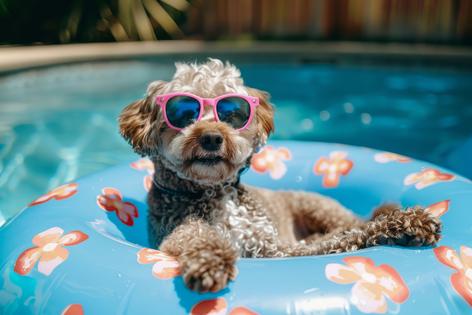My Pet World: Why a dog reacts differently to family members around the pool
Dear Cathy,
We have a wonderful eight-year-old "shihmalpoo" named Oliver. We have an in-ground pool. Whenever I enter the pool, Oliver becomes very frantic and races along the pool's fencing, barking wildly, clearly upset. He does not act this way when my wife enters, even though she is his primary caregiver. We have put him inside when we swim to avoid him overheating. Any suggestions?
— Steve, Kings Park, New York
Dear Steve,
Oliver's behavior might be influenced by several factors that cause him to react differently to you compared to your wife. Even though your wife is his primary caregiver, he might have a unique bond with you, making him more anxious when he perceives you’re in a potentially "dangerous" situation, such as being in the pool. Additionally, he might perceive you as more vulnerable or in need of protection, triggering his protective instincts.
Dogs can also pick up on subtle differences in body language, tone of voice, and energy levels, which can influence their reactions. Any past experiences involving you and water, even minor ones, could also have left a lasting impression on Oliver. Understanding the root cause of Oliver's behavior can be complex and might be a combination of these factors. Keeping him inside while you swim is a good temporary solution. To help him overcome his anxiety, though, here are a few things to try.
Try spending time with Oliver near the pool, so he can get used to the environment without the added stress of seeing you in the water. Start by standing near the edge and graduate to sitting with your feet in the pool, all the while interacting with him and giving him treats and praise to create positive associations. When he is comfortable with that, enter the pool step-by-step, going up a step if he begins to get stressed. (This process could take days or weeks.)
Another approach is to have your wife stay with Oliver and reassure him while you're in the pool. This might help him feel more secure knowing someone he trusts is nearby. You can also try using puzzle toys to distract him while you're in the pool.
If Oliver's anxiety persists, consider consulting with a professional dog trainer or behaviorist. A behaviorist can observe Oliver’s interactions with you and your wife, and provide additional, more personalized strategies to manage his anxiety.
Dear Cathy,
Many years ago, we adopted a dog, surrendered by the owner. She had been left alone for days at a time. She didn't like being alone, so we left the TV on and closed the blinds. We realized she was calmer with a light in the TV room, where she also had a bed. Her other bed was in the bedroom. Both beds had blankets or old T-shirts that smelled like my daughter. We also had treat filled toys placed around the house. We took her on a walk before leaving. When we left the house, we told her we had to go to school, be back, and love you. This was our routine.
— Marcee, Las Vegas, Nevada
Dear Marcee,
After such a difficult start, it sounds like you have gone to great lengths to ensure her comfort and well-being. Your routine of leaving the TV on, closing the blinds, providing beds with familiar scents, and placing treat-filled toys around the house was thoughtful and effective in helping her feel safe.
Giving her a walk before leaving helps her to nap afterwards. And kind words, in general, can make anxious dogs feel better. Dogs thrive on routine, and it sounds like you provided her with a stable and loving environment. Your story is a beautiful example of how patience, care, and understanding can transform the life of a rescued pet.
Dear Cathy,
I recently wrote to you about my dog's fear of fireworks. I tried Sileo and followed the instructions exactly. There was no improvement. My dog continued to pant and tremble. I have tried every other possible method, and nothing works.
— Joe, Suffolk, New York
Dear Joe,
I am sorry that Sileo (a gel-based product specifically for noise phobic dogs) didn't work. Noise phobias are challenging, and there's no cure or one-size-fits-all solution.
Instead, it may require trying a combination of things, such as using a pheromone collar, anxiety clothing like a Thundershirt® or Anxiety Wrap®, playing a white noise machine, and giving medication, all at the same time.
Your dog will always react to the noise, it’s just a matter of finding the things that will ease the symptoms. Please keep trying until you find the right combination for your dog.
_____
_____
========
(Cathy M. Rosenthal is a longtime animal advocate, author, columnist and pet expert who has more than 25 years in the animal welfare field. Send your pet questions, stories and tips to cathy@petpundit.com. Please include your name, city, and state. You can follow her @cathymrosenthal.)
©2024 Tribune Content Agency, LLC.
(c) 2024 DISTRIBUTED BY TRIBUNE MEDIA SERVICES, INC.












Comments